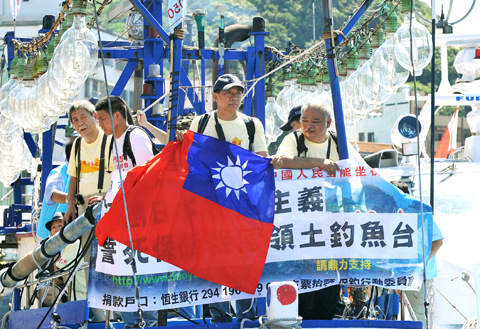Activists from both sides of the Taiwan Strait who advocate the defense of the disputed Diaoyutai islands (釣魚台) yesterday scaled down their plan to sail to the islets to claim sovereignty after seven people from Hong Kong and Macau backed off.
The seven dropped out after the National Immigration Agency told them joining the protest was inconsistent with the purpose for which their entry permits were issued and it would result in the revocation of their permits and a “denial of entry to Taiwan in future.”
Taipei County Councilor King Chieh-shou (金介壽), who together with the activists called on the governments on both sides of the strait to take a “stronger stance” against Japan on Saturday, also dropped out, citing difficulty renting boats because of government intervention.

PHOTO: PATRICK LIN, AFP
“It was really difficult to rent a boat. Not only was it expensive — at a cost of NT$300,000 to NT$500,000 — the government also threatened the boat owners and said it would revoke their license if they rented us their boats,” King said.
Despite the withdrawals, two Taiwanese activists stuck with the plan and set sail yesterday.
Chung Hwa Baodiao Alliance executive director Huang Hsi-lin (黃錫麟) and alliance member Yin Pi-hsiung (殷必雄) set sail on a 10-tonne fishing boat with a captain and two crewmembers from Yeliou Harbor (野柳), Taipei County, at 3:55pm.
A Coast Guard Administration (CGA) patrol ship followed in their wake.
Coast Guard official Shih Yi-che (施義哲) said the patrol would escort the fishing boat throughout the trip to “ensure their safety.”
The Japan Interchange Foundation, Tokyo’s semiofficial mission in Taipei, lodged a protest with the Ministry of Forrign Affairs after the vessel was allowed to leave port, calling the move ‘’extremely regrettable,” adding that it could have an adverse effect on relations between Taiwan and Japan.
The fishing boat is expected to approach the Diaoyutais early this morning.
“We want to show our support for the [Chinese] mainland ship seized by Japan and to fight for the rights of Taiwanese fishermen in the area,” Huang said.
The Diaoyutais, which are surrounded by rich fishing grounds and potential natural gas deposits, are located 193km east of Taiwan. They are administered by Japan, but Taiwan and China also claim sovereignty over them.
Led by Chen Miau Tak (陳妙德), chairman of the Hong Kong Diaoyutai Islets Protection Task Force, the group of seven from Hong Kong and Macau arrived in Taiwan on Friday following the arrest of a captain of a Chinese fishing boat by the Japanese coast guard after a collision with a patrol boat in the disputed area.
The incident coincided with Japan’s seizure of two Taiwanese boats for allegedly fishing illegally in the disputed area. Both were later released after paying a fine.
Later yesterday, the Ministry of Foreign Affairs issued a press statement reaffirming the government’s position on the Diaoyutais, saying they are part of the country’s “inherent territory” and fall within its “sovereign jurisdiction.”
Saying the protest was “spontaneously initiated by civil associations,” the ministry said it had asked the Japanese government not to interfere with the trip and to keep everything in perspective to uphold the mutual interests and long-term friendship of the two countries.

Chinese Nationalist Party (KMT) Chairman Eric Chu (朱立倫), spokeswoman Yang Chih-yu (楊智伃) and Legislator Hsieh Lung-chieh (謝龍介) would be summoned by police for questioning for leading an illegal assembly on Thursday evening last week, Minister of the Interior Liu Shyh-fang (劉世芳) said today. The three KMT officials led an assembly outside the Taipei City Prosecutors’ Office, a restricted area where public assembly is not allowed, protesting the questioning of several KMT staff and searches of KMT headquarters and offices in a recall petition forgery case. Chu, Yang and Hsieh are all suspected of contravening the Assembly and Parade Act (集會遊行法) by holding

PRAISE: Japanese visitor Takashi Kubota said the Taiwanese temple architecture images showcased in the AI Art Gallery were the most impressive displays he saw Taiwan does not have an official pavilion at the World Expo in Osaka, Japan, because of its diplomatic predicament, but the government-backed Tech World pavilion is drawing interest with its unique recreations of works by Taiwanese artists. The pavilion features an artificial intelligence (AI)-based art gallery showcasing works of famous Taiwanese artists from the Japanese colonial period using innovative technologies. Among its main simulated displays are Eastern gouache paintings by Chen Chin (陳進), Lin Yu-shan (林玉山) and Kuo Hsueh-hu (郭雪湖), who were the three young Taiwanese painters selected for the East Asian Painting exhibition in 1927. Gouache is a water-based

Taiwan would welcome the return of Honduras as a diplomatic ally if its next president decides to make such a move, Minister of Foreign Affairs Lin Chia-lung (林佳龍) said yesterday. “Of course, we would welcome Honduras if they want to restore diplomatic ties with Taiwan after their elections,” Lin said at a meeting of the legislature’s Foreign Affairs and National Defense Committee, when asked to comment on statements made by two of the three Honduran presidential candidates during the presidential campaign in the Central American country. Taiwan is paying close attention to the region as a whole in the wake of a

OFF-TARGET: More than 30,000 participants were expected to take part in the Games next month, but only 6,550 foreign and 19,400 Taiwanese athletes have registered Taipei city councilors yesterday blasted the organizers of next month’s World Masters Games over sudden timetable and venue changes, which they said have caused thousands of participants to back out of the international sporting event, among other organizational issues. They also cited visa delays and political interference by China as reasons many foreign athletes are requesting refunds for the event, to be held from May 17 to 30. Jointly organized by the Taipei and New Taipei City governments, the games have been rocked by numerous controversies since preparations began in 2020. Taipei City Councilor Lin Yen-feng (林延鳳) said yesterday that new measures by